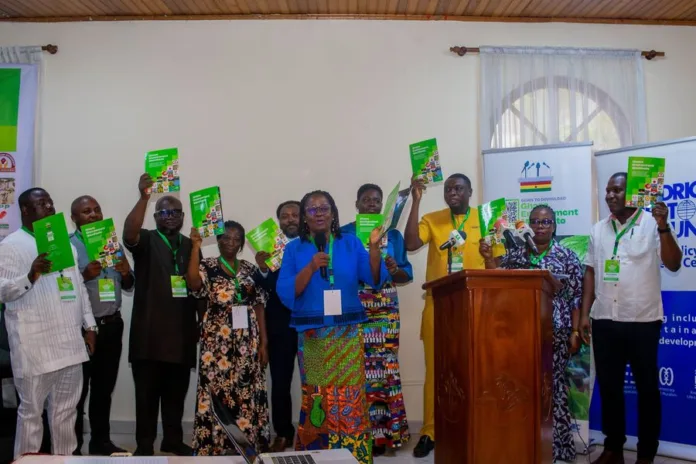
Civil Society Organizations (CSOs) and other non-state actors within the Natural Resources and Environment sector have launched the Ghana Environment Manifesto 2024.
The manifesto launch which was made possible through the partnership of Kasa Initiative Ghana, Green Livelihood Alliance Ghana, A Rocha Ghana and Friedrich-Ebert-Stiftung covers areas such as the Land Sector, Forestry Sector, Forest, Biodiversity and Agriculture Sector, Oil, Gas and Energy Sector, Environment and Climate Change Sector, Mining Sector, Wash Sector, Marine Environment and Fisheries Sector.
The document was developed over several months through broad engagements of Non-Profit Organisations (NPOs) within the natural resources, oil and gas, energy, Water, Sanitation and Hygiene (WASH), and climate change sectors, sharing inputs from their respective constituents across the country.
Presenting an overview of the manifesto at the launch in Accra on Tuesday, Mar. 26, Deputy Director of A Rocha Ghana, Daryl Bosu, noted that, considering the critical role party politics play in shaping the national development agenda, encompassing prioritization, investment, and effective implementation, it becomes imperative for aspiring political parties and public servants participating in the upcoming 2024 Presidential and Parliamentary elections to demonstrate active prioritization and commitment to a green and thriving development paradigm for the citizens of Ghana.
“Over the past decade, significant environmental challenges have emerged in Ghana, characterized by poorly regulated mining activities polluting major river basins, encroachment into forest reserves through government-granted mining concessions, and active state policies leading to the conversion of key ecological sites such as Achimota Forest, and MuniPomadze and Sakumo Ramsar Sites”.
“Community rights have come under serious attack from state-backed business interests, with a seemingly or deliberate weakening of enforcement and compliance measures like never before. The current situation envisions a bleak future, indicating a failure in both policy and political agendas to effectively address these pressing environmental issues. We cannot sustain a prosperous future if these developments are not addressed with the urgency they deserve” Bosu said.
He said, the Environment Manifesto is informed by the felt needs and aspirations of Ghanaians across the 16 regions over the increasing impunity and detrimental activities of government, corporations, and individuals, which sometimes have fatal and irreparable impacts on food, clean water, natural ecosystems, health and environment.
“Political commitment and implementation of this Environment Manifesto will galvanize broad citizen support as well as engender global investment and intervention in key sectors of the economy in line with the global urgency to address vulnerabilities associated with climate change, biodiversity loss, and environmental pollution”, he said.
This, he said, would contribute significantly to improving Ghana’s economic outcomes, within the agriculture, agro-based industries, forestry, and fisheries sectors, while improving the quality of the environment for all citizens.
He added, “It will also build resilience for climate change, address the depletion of Ghana’s natural heritage, and secure the provisioning and support services it continues to deliver to us all”.
Commitments and actions
Some of the commitments and actions in the Land Sector as demanded by the Manifesto include the need for women’s equitable access to land rights, affirmative action in the land sector for equitable land ownership, and the need for CSOs engagement and participation in land policy dialogues as well as strengthen land administration for proper land use planning and zoning.
In the Oil, Gas, and Energy Sector, some of the commitments include the Reprioritization of the distribution of petroleum revenue via the Annual Budget Fund Allocation (ABFA) to favor a green economy, and the need for Ghana National Petroleum Corporation (GNPC) to re-orient, rebrand and diversify their investment portfolio towards renewable energy in a progressive shift from fossil fuels dependence. There is also the call for an urgent need to diversify Ghana’s energy sources with a focus on increasing renewable energy mix and efficiency by 50% to drive access to affordable clean energy for industry expansion and job creation, while prioritizing renewable energy access for poor communities in Ghana.
In the Wash Sector, some of the commitments as captured in the manifesto include the full implementation of the buffer zone policy through an effectively enforced legal framework, to ultimately improve water resource management and thereby its contribution to ensuring access to clean quality water for all Ghanaians. There is also the call for the Presidential Compact for WASH, and move the national focus from ‘Basic Services’ to ‘Safely Managed’ as well as Legitimizing informal sector waste workers and integrating them into the formal waste management architecture.
In the Environment and Climate Change Sector, the Manifesto is demanding a review of the Emissions Levy, and the adoption of a national Cap and Trade levy system, with responsibility on the high-end polluters. Revenue from the Emissions Levy fund should be directed towards climate mitigation and adaptation interventions with clear transparent and accountable measures in the legislative provisions. There is also the call for the provision of gender-inclusive climate-resilient programmes in agriculture. Facilitate climate-focused, cost-benefit analysis of mining against the destruction of the environment and facilitate the expedited passage of the Climate Action Bill into Law as well as setting up and operationalizing environmental courts with a legal aid support system to address the increasing environmental crimes in Ghana.
In the Marine Environment and Fisheries Sector, the Environment Manifesto called for a review of existing legislation and ensure stringent regulations, promote advanced technology, ensure transparent supply chains, and impose severe penalties to combat IUU fishing, illegal transshipments, and overfishing by foreign vessels, with a focus on sustainability, community involvement, and consumer awareness. It also demanded political commitment with adequate resources to end illegal fishing, with no interferences, in sector law enforcement and prosecution-related matters. It also demanded the prioritization of the establishment, development, and management of Marine Protected Areas in Ghana as well as the Institute of a National Mangrove Restoration and Coastal Community Resilience program critical for protecting coastal communities and sustainable mangrove utilization.
In the Forest, Biodiversity and Agriculture Sector, the manifesto demands secured food sovereignty of farmers and citizens by protecting farmers and seed developers’ rights and repeal any Plant Breeders Act provisions that put the power for seed control in the hands of corporate agencies. Empower local communities to tackle issues of illegal mining, focusing on the driving force of the youth and this can be in the form of using community-led task forces to fight the galamsey menace. There is also the call to reinstate the full extent of Achimota Forest by abolishing EI 144 and taking steps to develop the Achimota Forest into a thriving urban forest for the benefit of all Ghanaians as well as the repeal of LI 2462 (Environmental Protection (Mining in Forest Reserves) Regulations) and enact relevant legislation to exclude mining from all forest reserves and river basins in Ghana.
In the Mining Sector, the manifesto demands the review of the Minerals and Mining Act to institutionalize a Public Interest and Accountability Committee (PIAC) for Mineral Governance just as there is PIAC for the petroleum industry. This, it said, will cure the failure in the Parliamentary Oversight role concerning rights allocation, performance and safeguards, and mineral funds management. Ensure passage of the Minerals Revenue Management Law (MRMA) that regulates how all mineral revenues should be utilized.
Political must prioritise environmental and green pathways
On his part, the National Director of A Rocha Ghana, Dr Seth Appiah-Kubi called on political parties to prioritise environmental and green pathways as part of their potential future government’s development agenda.
“We are looking at a future where the nations who have hedged against the devastating effects of climate change through adequate adaptation measures and water security investments will be the ones whose populations have a secured well-being”, he said.
The Programmes Coordinator, Friedrich-Ebert-Stiftung Economic Policy Competence Centre, Ms Eunice Asiedu commended A Rocha Ghana and other environmental Civil Society Organisations for putting together an environmental manifesto describing it as progressive, hence their support of the process.
“Given the critical role the environment plays in our continuous survival, I urge the political parties to urgently centre environmental sustainability at the centre of their development agenda and we look forward to yet another political season with the environment at the centre of campaigns and subsequent conscious effort toward its implementation”, she added.
Representatives from the National Democratic Congress (NDC) and the Convention People’s Party (CPP) who were present at the launch promised to adopt the environment manifesto in their 2024 party’s manifestoes with a promise to implement all the recommendations if given the opportunity to govern after the December 7, 2024 general elections.
Source: Ghana/Starrfm.com.gh/103.5FM




